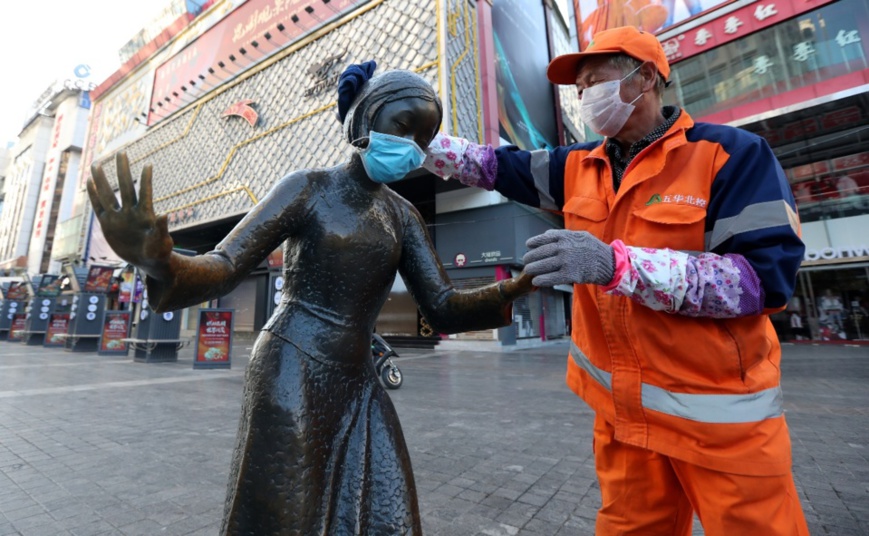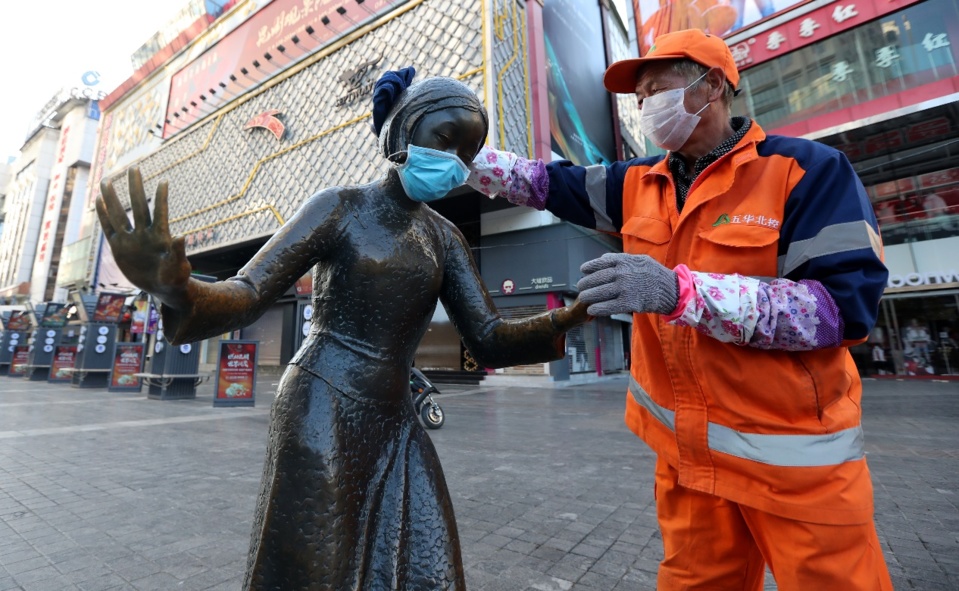By Gauden Galea, WHO Representative in China

A sanitation worker puts a mask on a sculpture at a pedestrian mall in Kunming, capital of southwest China’s Yunnan province, to remind citizens to wear masks when they go out, Feb. 6, 2020. Photo by Yang Zheng/ People’s Daily Online
In a few short weeks, the words ‘novel coronavirus’ have become a household term in China and around the world. This is not surprising. Whenever a new virus crosses from the animal kingdom into the human domain, the world pays attention. Public health experts are always alert to possible new diseases that could spread between people and cause illness and death.
Unknowns about how much risk a virus poses and how people can protect their loved ones can lead to anxiety and fear among the public. History shows that individuals’ behavior is a key factor for responding to a new communicable disease.
When public health experts assess the risk to humans of a new virus, they look at two key factors: transmission and severity.
The 2019 coronavirus (2019-nCoV) is still a new virus so it is hard to draw conclusions. But it seems that, for the average person, the virus may cause less severe disease than other coronavirus outbreaks such as SARS and MERS-CoV. For most people, 2019-nCoV seems to cause mild cold-like symptoms. It can sometimes progress to a more severe illness, particularly in some vulnerable groups including people with existing conditions such as cardiovascular problems, diabetes, liver problems and respiratory diseases. Older people also appear more likely to be susceptible to severe illness.
When we look at transmission, at this stage, it appears that 2019-nCoV spreads most easily when someone who has symptoms comes into close contact with others. Further investigation is needed but based on past experience with coronaviruses and other respiratory illnesses, asymptomatic transmission, while possible, is rare and unlikely to be a driver of this outbreak.
Even a virus that is often mild across the general population, and severe in certain vulnerable groups, could cause tragic deaths if it were to transmit easily between people. And a mild virus that transmits easily between people could be a challenge for some fragile national health systems that are already fully occupied with other health priorities such as obstetrics, chronic diseases or other outbreaks.
This is why the WHO director general has declared 2019-nCoV as a public health emergency of international concern: many fragile national health systems around the world are not prepared for a new epidemic – even one that might prove to be mild across the general population.
China has made progress over many years in its surveillance, reporting, investigation capacity and ability to control disease. The WHO’s top priority is supporting the people of China and the world to limit transmission of 2019-nCoV. The WHO will continue to work with the government of China and advise on how to respond.
From what we have learned so far, it is likely that the 2019-nCoV transmits primarily via droplets emitted when people with the disease cough or sneeze and by ‘fomites’ – small droplets that transfer to people through physical contact or touching contaminated surfaces. Hands can play a key role in the transmission of all coronaviruses as hands touch many surfaces which can be contaminated with the virus. As a result, WHO recommends the following five key action areas to help people limit transmission of 2019-nCoV.
First, maintain at least one meter between you and others. A virus can spread through shaking hands, touching and other physical contact. It can also travel short distances through the air when a person with the disease sneezes or coughs.
Second, maintain the highest standards of hand hygiene. Wash your hands properly with soap and water, or an alcohol-based rub. This is especially important before eating, after touching surfaces or other people, after coughing or sneezing, before handling or preparing food, after touching animals, after going to the toilet or changing a child’s nappy.
Third, if you sneeze or cough, cover your mouth and nose with a tissue or your bent elbow. Dispose of any used tissues immediately in a closed rubbish bin and wash your hands after sneezing or coughing. Do not spit.
Fourth, if you choose to wear a mask, learn how to do so correctly. Make sure you wash your hands before putting it on and handle the mask by the strings. If the mask becomes moist while being worn, replace it. After taking off the mask by the strings, throw the mask in a closed bin and wash your hands.
Fifth, it is important for people to understand when to self-isolate and when to seek medical attention. Anyone with mild cold- or flu-like symptoms should stay home, rest and isolate themselves from others. But please pay close attention to your symptoms. If you develop a fever of over 38 degrees Celsius, have difficulty breathing or other more severe symptoms, please call (or ask a loved one to call) a fever clinic or health facility immediately.
Lastly, make sure that any information you share about 2019-nCoV with friends, loved ones or through social media has been confirmed by the WHO or government authorities. During times of uncertainty, rumour and misinformation – even well-intentioned – can spread faster than any virus and may harm people and complicate efforts to stop transmission.
2019-nCoV is a new public health challenge for all of us. To respond, we must support each other and closely follow the science. It is through working together, and being there for each other, that we can limit transmission and move forward together.
(Source: People’s Daily)
Unknowns about how much risk a virus poses and how people can protect their loved ones can lead to anxiety and fear among the public. History shows that individuals’ behavior is a key factor for responding to a new communicable disease.
When public health experts assess the risk to humans of a new virus, they look at two key factors: transmission and severity.
The 2019 coronavirus (2019-nCoV) is still a new virus so it is hard to draw conclusions. But it seems that, for the average person, the virus may cause less severe disease than other coronavirus outbreaks such as SARS and MERS-CoV. For most people, 2019-nCoV seems to cause mild cold-like symptoms. It can sometimes progress to a more severe illness, particularly in some vulnerable groups including people with existing conditions such as cardiovascular problems, diabetes, liver problems and respiratory diseases. Older people also appear more likely to be susceptible to severe illness.
When we look at transmission, at this stage, it appears that 2019-nCoV spreads most easily when someone who has symptoms comes into close contact with others. Further investigation is needed but based on past experience with coronaviruses and other respiratory illnesses, asymptomatic transmission, while possible, is rare and unlikely to be a driver of this outbreak.
Even a virus that is often mild across the general population, and severe in certain vulnerable groups, could cause tragic deaths if it were to transmit easily between people. And a mild virus that transmits easily between people could be a challenge for some fragile national health systems that are already fully occupied with other health priorities such as obstetrics, chronic diseases or other outbreaks.
This is why the WHO director general has declared 2019-nCoV as a public health emergency of international concern: many fragile national health systems around the world are not prepared for a new epidemic – even one that might prove to be mild across the general population.
China has made progress over many years in its surveillance, reporting, investigation capacity and ability to control disease. The WHO’s top priority is supporting the people of China and the world to limit transmission of 2019-nCoV. The WHO will continue to work with the government of China and advise on how to respond.
From what we have learned so far, it is likely that the 2019-nCoV transmits primarily via droplets emitted when people with the disease cough or sneeze and by ‘fomites’ – small droplets that transfer to people through physical contact or touching contaminated surfaces. Hands can play a key role in the transmission of all coronaviruses as hands touch many surfaces which can be contaminated with the virus. As a result, WHO recommends the following five key action areas to help people limit transmission of 2019-nCoV.
First, maintain at least one meter between you and others. A virus can spread through shaking hands, touching and other physical contact. It can also travel short distances through the air when a person with the disease sneezes or coughs.
Second, maintain the highest standards of hand hygiene. Wash your hands properly with soap and water, or an alcohol-based rub. This is especially important before eating, after touching surfaces or other people, after coughing or sneezing, before handling or preparing food, after touching animals, after going to the toilet or changing a child’s nappy.
Third, if you sneeze or cough, cover your mouth and nose with a tissue or your bent elbow. Dispose of any used tissues immediately in a closed rubbish bin and wash your hands after sneezing or coughing. Do not spit.
Fourth, if you choose to wear a mask, learn how to do so correctly. Make sure you wash your hands before putting it on and handle the mask by the strings. If the mask becomes moist while being worn, replace it. After taking off the mask by the strings, throw the mask in a closed bin and wash your hands.
Fifth, it is important for people to understand when to self-isolate and when to seek medical attention. Anyone with mild cold- or flu-like symptoms should stay home, rest and isolate themselves from others. But please pay close attention to your symptoms. If you develop a fever of over 38 degrees Celsius, have difficulty breathing or other more severe symptoms, please call (or ask a loved one to call) a fever clinic or health facility immediately.
Lastly, make sure that any information you share about 2019-nCoV with friends, loved ones or through social media has been confirmed by the WHO or government authorities. During times of uncertainty, rumour and misinformation – even well-intentioned – can spread faster than any virus and may harm people and complicate efforts to stop transmission.
2019-nCoV is a new public health challenge for all of us. To respond, we must support each other and closely follow the science. It is through working together, and being there for each other, that we can limit transmission and move forward together.
(Source: People’s Daily)
 Menu
Menu
 Taking necessary precautions helps squash spread of virus
Taking necessary precautions helps squash spread of virus
















